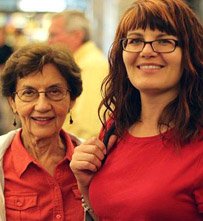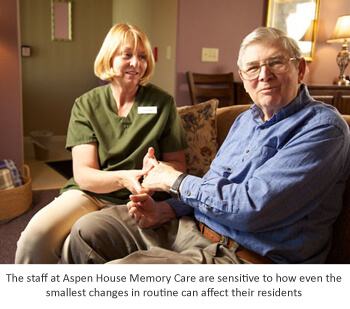Assisted Living Directory Interview: Discussing Routines and Changes and Their Effects On Assisted Living and Alzheimer's Residents

Summary: In Part 2 of our interview with Jean Cannon of Aspen House Memory Care in Loveland, Colorado, Jean discusses routines and how small changes can have a significant effect on residents with memory disorders or Alzheimer’s Disease. Jean offers her insight on how she has minimized the adverse affects of routine changes on residents. To find out more about Aspen House, please visit their Aspen House page or call (970) 635-9800. (View Part 1 of our interview with Jean about the challenges and rewards of operating an assisted living facility.)
[Video] Interview – Part 2 Of Our Interview With Jean Cannon – Discussing Routine Changes In An Assisted Living / Memory Care Environment.

In our second part of our interview with Jean Cannon, Jean shared her insights on how even the smallest of changes with anything – routines, meals, or really anything else can have a profound effect on the residents at her facility. Jean offered her strategies on how to minimize perceived ‘changes’ in the day-to-day operations and management of her facility, in an effort to keep her residents – many of whom have Alzheimer’s Disease or other memory disorders – happy and comfortable.
Jean started this segment of our interview telling me that changes such as a new resident moving in Staff and routine changes with residents of memory carecan be a very stressful event for everyone, including the person moving in, for their families, and for the people who already live at the facility. It can also be very stressful for the staff. However, Jean uses the word ‘stressful’ for lack of a better word – and is quick to point out that it isn’t necessarily stress in a bad way – it’s just a big ‘change’ that everyone needs to adjust to. Jean mentions that even seemingly small things like a new setting at the table can look very different to her residents, and can be challenging for some of them to get used to.
After about 24-36 hours of a new resident moving in, everyone seems to settle down and get used to the new routine.
As Jean took me on a tour of her facility, before we sat down for the ‘interview’ part of the visit, I felt that my presence at the facility was causing a degree of discomfort with some of her residents. I asked Jean about this, and she agreed with me about this. Jean went further to tell me about three women at her facility in particular that were having some difficulty and anxiety at about the same time every day – about 2:30 to 3:00 every day – and she finally realized that it was something they (the facility) was doing to “cause” (for lack of a better word) the distress. It was due to a ‘shift change’ at 2 in the afternoon. At that time, people are coming onto their shift, and others are leaving. The staff, at this time may be putting on their coats, making some noise, saying hello and goodbye to people – so it was a 10 minute period of the shift change that was the culprit.
Her solution to this issue was to have her staff come in through the side doors, and be very quiet as to not make such a big ‘scene’ during this transition time.
Jean says that from that day forward, she has seen a minimal level of anxiety at that time of the afternoon with her residents.
Jean is also reluctant to use the word ‘behavior’ at the facility because that almost implies something negative, in her view. Instead, she says that when people start ‘acting differently’ from what they did the week earlier, for example, they look at it as an opportunity to try to figure out what it is the resident is trying to ‘tell them.’ At times, residents aren’t able to articulate their problems or concerns to the staff to say even simple things like “my toe hurts” or “I am hungry” so the ‘challenge’ or really, ‘opportunity’ for Jean, and her staff is to try to figure out what is causing a resident to present themselves in a different way, and respond accordingly.

No Obligation
Assisted Living with Assisted Living Directory Interview: Discussing Routines and Changes and Their Effects On Assisted Living and Alzheimer's Residents




